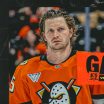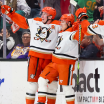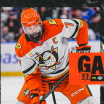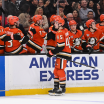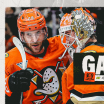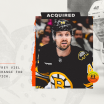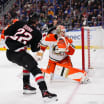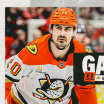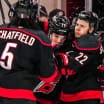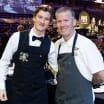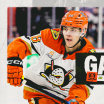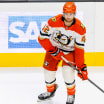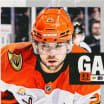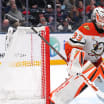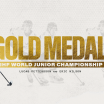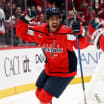It's almost time for a busy, important summer in Anaheim, one that could shape the future of the Ducks' championship aspirations.
And for General Manager Pat Verbeek, it's a chance to turn the page on a disappointing season while putting more pieces in place in building the roster that fits his vision for Anaheim's style of play.
Verbeek discussed those plans and much more this past weekend in an exclusive sit-down with Special Advisor to Hockey Operations Scott Niedermayer, television analyst Brian Hayward and hundreds of Orange Alliance members.
The GM provided some rare public candor on his team's struggles this year, the details behind his moves at the NHL Trade Deadline and a look ahead to the decisions, strategies and relationships at the crux of his organizational philosophy.
Verbeek Reflects on Ducks Struggles, Previews Crucial Summer in Anaheim
At an exclusive event for Orange Alliance members, Verbeek and Special Advisor to Hockey Operations Scott Niedermayer discussed the team's disappointing record, its impressive prospect pool, trade deadline deals and more
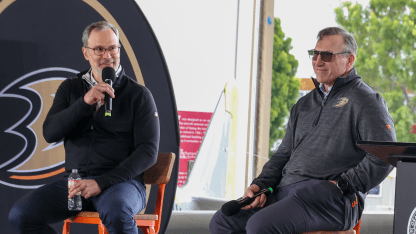
Make no mistake, Verbeek is disappointed at how Anaheim's season has played out. He knew better than any that his team was headed for a rebuilding year and expected the growing pains any young team inevitably experiences, but a bigger priority for Verbeek was establishing the principles he believes should carry the organization: building a big, strong, physical team that opponents know well in advance is a bear to play against.
"I think overall, with the way the team was penciled on paper, I would have expected the team to have done better than what our record is," Verbeek admitted. "I think early on with the team, and you're going to hear me say this a lot, the compete level wasn't at a standard of what I expected. I want us to be really hard to play against, and we were too easily pushed aside. We weren't competing hard enough to win pucks. So I think that kind of contributed early on to the record.
"I think as the season has progressed, we've certainly gotten a lot better in that perspective. There are a lot of things that different players and different teams have to go through, and they had to learn to compete harder."
Our full NHL Trade Deadline special is here!
— Ducks Stream (@DucksStream) March 3, 2023
Hear from @AnaheimDucks GM Pat Verbeek, newly acquired winger Brock McGinn and commentary from Brian Hayward and @AlexisDownie_
🍎 https://t.co/b97uOYYjpL
🎧 https://t.co/vxj5Yv5opu
💻 https://t.co/5EzrrAMTlb pic.twitter.com/016hnmzKGK
To Verbeek's point, Anaheim's first two months of the season were at best difficult, and at worst miserable. On Dec. 15, the Ducks sat dead last in the NHL by point percentage (.306), with an 8-20-3 record. Since then, the club has gone 14-15-5, including two five-game point streaks and an 8-6-3 mark away from home ice.
READ MORE: Verbeek Recaps Trade Deadline, Looks Ahead to Summer Plans
Any season likely heading towards a conclusion well short of the postseason carries the subsequent questions on draft positioning, but Verbeek strongly shot down any notion that he would accept losing in exchange for increased lottery odds. To the man once known as "The Little Ball of Hate", competition must be at the core of any successful rebuild, regardless of the significance, or lack there of, in the standings or playoff race. Simply put, he had no interest in tearing down his roster to the absolute bare bones in hopes of a better draft pick.
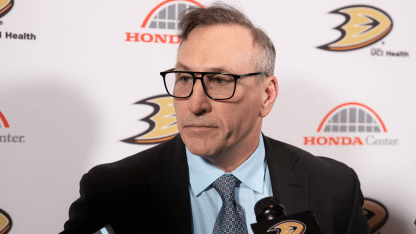
"The integrity of sport is winning," Verbeek said. "We're here to win. So are the players. It's their careers. They're fighting for jobs, and I don't want to take that away, their ability to do that."
Young Core
Competition can still come with an increased opportunity for the organization's young core to prove itself in increased roles, as rookie Mason McTavish has done throughout the season. McTavish's offensive ability has caught the attention around the league, especially his propensity for crushing power-play one-timers, but Verbeek and head coach Dallas Eakins alike have taken notice at how the mature 20-year-old spends his days at the rink.
"He started on the fourth line and has worked his way now up onto the second line," Verbeek said. "He's progressed very nicely there. I think his defensive game has taken big strides. He's a smart kid. He's a smart hockey player. Now it's just about gaining more experience for him. He's only 19, so he's gonna get better in the next couple years. He'll take big steps."
McTavish lives by one of Verbeek's guiding principles in player development: You can never spend too much time in the gym.
"Mason's a really strong kid, so he's able to handle the physical part of it," Verbeek said. "A lot of times the reason these younger players can't make it to the NHL - it's not because they don't have the talent, it's because they're not strong enough.
"They're playing against players that weigh 220 pounds now and some of them are only 185 pounds coming into this. So it becomes difficult. They're giving all that weight and strength up. The last thing that I want to do, and I've seen it in other organizations, is get these players hurt. They get nicked up or the odd concussion, and it's all because they're physically ready to play in the NHL ability-wise, they're able to play, but it's the strength. So that's why I constantly harp on these kids, 'Guys, in the gym, in the gym, in the gym.' You can't spend enough time in the gym."
McTavish constitutes one-quarter of the young NHL core Verbeek pointed to as learning the ropes, alongside Trevor Zegras, Jamie Drysdale and Troy Terry. Only McTavish is already signed heading into next season, with Zegras, Drysdale and Terry heading for restricted free agency. Verbeek said he will begin negotiations with each of the three following the season, electing to let the players focus on another formative year early in their careers.
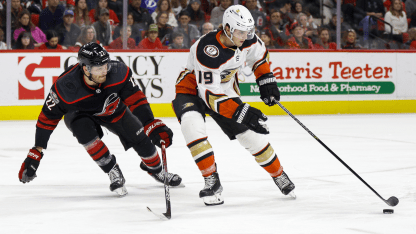
"Troy's goal-scoring hasn't been quite as high, but I think there's been a lot of other elements [of his game] that have improved," Verbeek said of the now two-time All-Star winger. "His strength has improved. I still see a lot more upside with Troy Terry. It's funny, every player goes through different stages and how they get to the level that they need to get to. I think Troy is just actually really starting to figure out the off-ice conditioning, the strength that he needs to play against the best defensemen each and every night. He's starting to understand the mental approach that you need to take playing against the best players in the league every night."
Of Zegras he said, "He's obviously doing well offensively and he's made strides in his game defensively. For me, there's still has a lot to work on from a defensive standpoint. I would say he needs to get stronger as well. He's going to be facing the 6-foot-4, 6-foot-5 defensemen on a nightly basis. That's not an easy thing to do over an 82-game schedule. So being physically strong to be able to handle that on a nightly basis is tough. That's, to me, where Trevor needs to keep improving."
"Jamie Drysdale, unfortunately, was hurt early in the season," Verbeek concluded. "He's probably in the fourth month of his rehab on a shoulder surgery. So we'll see here in the next three or four weeks to if he returns or has consideration to return. At the worst, he'll be ready for next year."
For Verbeek, and his right-hand-man Niedermayer, there's no doubt next year needs to be another step in the rebuilding process, but both cautioned the perils of putting too much on a young player's plate too early.
"It's extremely important that these guys can have some success as they're finding their way," Niedermayer said. "It's a cruel game sometimes out there and when things start going bad, your confidence can kind of get soft. That's a tough way to play. So these young guys have to be able to, in a situation where they can be challenged, take some hard knocks, but also have some success as they're finding their way in learning their game.
"It does take time. If we're aware of that and we allow it, it should pay off where they have great long careers and a lot of success ahead of them."
Deadline Deals
The club's lack of early results made selling its prominent pending unrestricted free agents at the deadline a near certainty, with Verbeek and his staff eventually agreeing to a pair of deals with Pittsburgh and Minnesota.
Anaheim first sent defenseman Dmitry Kulikov, who Verbeek acquired just prior to the season for Future Considerations, to the Penguins in exchange for sparkplug winger Brock McGinn and a 2024 third-round draft selection.
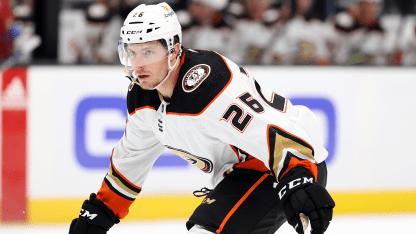
"I've always liked McGinn as a player," Verbeek said. "He played in Carolina and was in Pittsburgh this season. He brings grit and competitiveness, an energy I want 20 players to have. Whether they're skilled or highly skilled, I want all of our players to bring that element every night to the rink. So we made the investment. He has two more years on his contract right now and I think we got good value there."
McGinn made his Ducks debut Tuesday night in Seattle, skating on a line with Zegras and Ryan Strome.
The second trade went down to the wire, as Anaheim and Minnesota agreed on a Klingberg deal with literally two minutes to spare. Klingberg signed a one-year contract with Anaheim last summer, leaving Dallas for the first time in his then eight-year NHL career, and found difficulty in replicating the production that made him one of the game's best offensive blueliners.
"I think, at the start of the season, he really pushed and tried to do more than he probably should have tried to do," Verbeek said. "I think, with any player, when you're trying to have the best year possible, you can start pushing too hard and you start trying too hard. Things don't work out and, in this instance, he ended up having a real tough season."
In return for the Swedish defenseman, Verbeek acquired prospect forward Nikita Nesterenko, a fourth-round pick and former Duck Andrej Sustr, who also played under Verbeek in Tampa Bay.
What! A! Goal!
— EP Rinkside (@EPRinkside) February 7, 2023
Nikita Nesterenko (#MnWild) goes coast-to-coast and snaps one past the Harvard goaltender to make it a one-goal game for Boston College. 3-2 late in the third.
Assists on the play to Lukas Gustafsson and Oskar Jellvik (#NHLBruins)
🎥: @TSN_Sports pic.twitter.com/XwwTVTGfbY
"I'm really excited about the kid," Verbeek said of Nesterenko. "He's 6-foot-2, skates well and has high skill. I've been watching him for three years in college, so I know the player and feel comfortable with him coming into our organization. I think the big thing for him is he made a big jump in his competitiveness, being the type of player getting to the net and competing hard in front of the net. That's where he really changed his game and what made him more successful, being able to produce a lot more this year than he had in his prior two years. I was excited to get him."
Verbeek said the addition of Sustr was to provide another veteran defender to a group losing Kulikov and Klingberg.
One player Verbeek did not move, despite persistent rumors across the league, was goaltender John Gibson, whose outstanding February just reiterated the caliber of player and the immense value it would take to justify moving him.
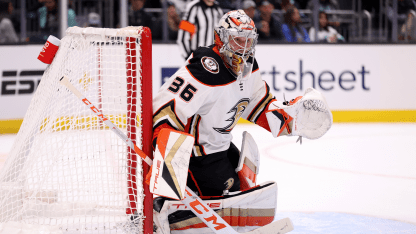
"I'm not considering moving John Gibson," Verbeek said flatly. "I've actually sat down and had a conversation with him about this. We have an excellent number one goaltender. The hardest thing in the NHL is finding a number one goaltender and I can speak from experience on this, because when we were in Tampa, we did not have a number one goaltender and we gave up numerous assets trying to chase one.
"Finally we were able to draft one with Andrei Vasilveskiy. When you have one, you don't give them up unless you've got another one that's coming behind. At this point, we're very young with our goaltenders and certainly we're not at that stage where anyone can take John Gibson's position at number one right now."
Prospect Pipeline
But maybe the biggest takeaway from the peek under the hood, was the palpable excitement from Verbeek and Niedermayer at the immense potential of the young defensive stable at their disposal.
"Next year, just on defense alone, we have Olen Zellweger, Pavel Mintyukov and Tyson Hinds (turning pro)," Verbeek said. "I'm not sure where Jackson Lacombe is gonna end up yet, but he's gonna start with Anaheim when his college season is over this year. But those are four highly respected prospects there. San Diego next year is probably gonna see a lot of who is gonna be playing for the Ducks, hopefully in a couple years. So it's really exciting for me, and for our both organizations."
Olen Zellweger is the definition of an Offensive Defenceman 🔥@AnaheimDucks pic.twitter.com/2ahvBasS9f
— Kamloops Blazers (@blazerhockey) March 5, 2023
Verbeek said he leans on his resident Hall of Fame defenseman for analysis and guidance on blue line prospects, more than comfortable in deferring to a man who knows more about the position that maybe anyone in the game.
"We have a really young defense corps," Verbeek said. "I ask him to go mentor them, go watch them. I also ask him to go watch games when we're looking (at a player). I don't profess to know every little nuance of what the best defenseman could be. So I ask him to go do that. I see what my eye sees, but I want his opinion too."
Niedermayer touched on the strengths of each of the four defensive prospects Verbeek mentioned, praising Lacombe's skating skills and smarts and highlighting Mintyukov's playoff chances on a strong Ottawa team, but seemed most impressed with the development of Zellweger.
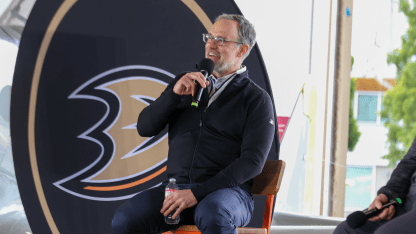
A two-time World Junior Gold medalist, Zellweger was traded midseason for a monstrous haul of draft picks to the Kamloops Blazers, Niedermayer's old team in the Western Hockey League. Since first donning the blue, orange and white, Zellweger has collected 38 points in 22 games with a +29 rating.
But for Zellweger the offensive impacts are well-known. The knock has always been about his size as a 5-foot-9 defenseman in a league full of giants. For Niedermayer and Verbeek though, Zellweger's intense desire to compete and his willingness to make the gym his home away from home has stood out more than any on-ice play.
"He wants to do something every time he's on the ice," Niedermayer said. "When you get to the highest level of hockey, sometimes that can be a challenge, and you have to figure out when and where you do that. But you love to see it. Pat talked about the competitiveness and what he wants in players. [Zellweger] has it. He has that competitiveness."

